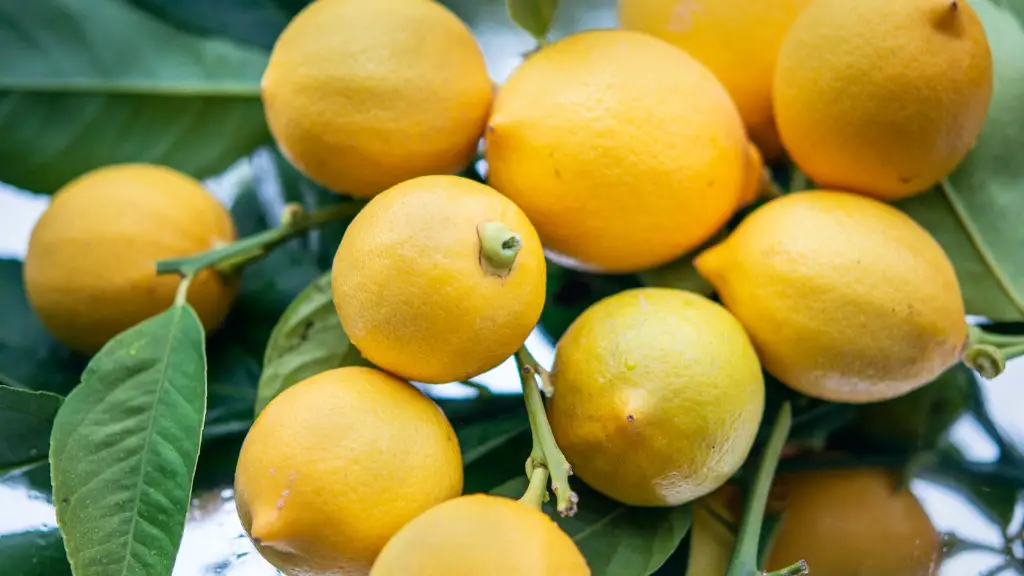It is extremely important to choose the right kind of soil for an avocado tree, as this will determine the fruits it produces and the condition of the tree’s health. Avocado trees have strict requirements when it comes to soil because they need access to plenty of nutrients, good moisture retention and proper drainage.
Avocados thrive in soil that is slightly acidic. The ideal level of soil acidity is generally between 5.0 and 6.5. It is also essential that the soil have an adequate nutrient balance in accordance with the avocado tree’s needs. A soil test will be required to establish which nutrients are required and in what quantities.
For most soils, the addition of organic matter is beneficial. Compost is an effective way to supply the tree with extra nutrients, as well as beneficial microorganisms. In some cases, a professional soil treatment may be required, to improve the physical characteristics of the soil and to balance the nutritional content.
In order for an avocado tree to flourish, adequate drainage must be provided. The soil should be relatively loose, with a texture between sandy and loam, with the addition of organic material for the benefit of the tree. Heavy soils should be avoided as they can lead to water logging and root rot.
The avocado tree responds best to a well planned irrigation system, since they are susceptible to both under and over-watering. A soil moisture meter can be used to measure the level of water present in the soil, allowing the gardener to adjust the irrigation system to the right amount.
To summarise, an avocado tree needs access to a slightly acidic soil with good drainage, organic matter added for nutritional value, and an irrigation system to keep moisture levels at adequate levels for healthy production. Adhering to these requirements will ensure that the tree can produce high quality fruits over a sustained period of time, contributing to the stability and prosperity of the orchard.
Improving the Soil Quality
Soil fertility plays a crucial role in the health of an avocado tree, and should be improved wherever possible. If soil testing shows that the soil lacks in essential nutrients, supplementary fertilisers can be applied. It is important to choose a suitable fertiliser that provides necessary nutrients without disrupting the soil’s pH level.
Organic matter can be added to the soil to increase microbial activity and nutrient absorption. In addition, mulches and cover crops can be used to suppress weed growth and retain moisture in the soil. Mulching the soil provides the added benefit of reducing soil erosion and helps the soil retain vital nutrients.
In situations where the soil does not meet the requirements of the avocado trees, soil amendment ought to be used to adjust the soil’s chemical, physical, and biological properties. Soil amendments allow the gardener to alter the texture of soil, as well as adding nutrients and improving the soil’s ability to hold water.
Organic matter and compost are the two most popular soil amendments for avocados, but there are also chemical and synthetic products available. However, it is essential that any products used on the soil be certified safe and compliant with local regulations.
Although it might be time consuming and expensive, the rewards of improving the soil quality and fertility of an avocado orchard will pay off in the long run. Not only will the tree’s health improve, but the quality and yield of fruits will also be enhanced.
Compost Tea
Compost tea is a great way of providing essential nutrients to avocado trees without the need for artificial chemical fertilisers. Compost tea is made by soaking compost in water, creating a nutrient-rich liquid that can be applied directly to the soil, or sprayed onto the leaves of the avocado tree.
Making an effective compost tea is not an easy task, as it must be brewed in the correct manner and for the right duration to ensure that it contains the nutrients needed for optimal plant development. It is strongly recommended that the compost tea be tested for nutrient levels before it is applied, to ensure that it is of sufficient quality for the desired purpose.
Compost tea is effective in improving the fertility and health of the soil, benefitting the avocado tree in the long run. Although it is more time consuming and labor-intensive than using chemical fertilisers, the lack of any potential harmful effects makes it a preferred choice in orchard management.
Used correctly and frequently, compost tea can be a great way to improve the soil fertility of an orchard and help protect the trees against diseases and pests. While chemical fertilisers may produce a faster result, the use of compost tea will have lasting effects on the health and yield of the avocado trees over time.
Signs of Poor Soil Quality
It is important for avocado growers to be aware of the signs of poor soil quality, as this can indicate that immediate changes need to be made to the soil quality in order to preserve plant health. An indication of poor soil quality is visible signs of nutrient deficiency on the avocado tree, such as yellowing leaves.
A soil test will reveal what nutrients the tree is lacking and indicate whether the soil composition needs to be amended in order to improve its fertility. Additionally, poor soil quality can weaken the tree, making it more susceptible to diseases, pests and other environmental threats.
Soil that becomes compacted or overly wet can lead to root rot in avocado trees, resulting in stunted growth, poor fruit production, and potentially even death. It is important to be familiar with indicators that can show when the soil quality is not up to the standards required by avocado trees.
Without a doubt, a thorough understanding of soil requirements is essential in order to achieve success when planting and nurturing an avocado orchard. Taking the time to perform appropriate tests and monitor soil conditions regularly is a necessary investment, as it can help ensure that the tree remains healthy and yields maximum fruits.
Organic Vs Non-Organic Farming
When it comes to selecting the right soil for avocado trees, practitioners of organic farming will often opt for alternative methods of soil amendment. For example, a soil made up of composted leaves, branches and other organic materials might be favoured over synthetic amendments which may contain chemicals that are potentially harmful to the soil or even the tree itself.
Organic farming is becoming increasingly popular, as it has the advantage of improving the soil quality over time and avoiding the addition of potentially hazardous substances that could harm the tree. In some cases, by gradually enriching the soil with organic materials, the gardener can avoid the need for fertilisers altogether.
Non-organic farming on the other hand does not have the same restrictions, as chemical and synthetic fertilisers can be used to amend the soil and increase fertility. This approach has the advantage of providing quick results and can produce high quality fruits with minimal effort.
In the end, the decision between organic and non-organic farming methods lies with the individual. Each method has its own set of benefits and drawbacks and each tree should be considered on a case-by-case basis in order to decide what is best for its health and yield.
Fertiliser Schedules
Once the soil quality and fertility has been established, an appropriate fertilisation schedule can be implemented. Avocado trees require organic or chemical fertilisers to supply essential nutrients, particularly nitrogen, potassium and phosphorus.
It is essential that the fertilisers are applied at the ideal times of the year, according to the local growing seasons. Usually, two to four applications of fertiliser per year will be sufficient to keep the avocado trees in full fertility, although this can vary depending on climate and soil characteristics.
Care should also be taken to ensure that the fertilisers are correctly applied to the soil and do not leach into the ground water. Fertilisers should be distributed evenly throughout the soil, and not concentrated in any particular area. Uncontrolled fertiliser applications can lead to lack of adequate nutrients for the tree, as well as environmental and health risks.
In conclusion, an avocado tree requires the right kind of soil to produce high quality fruits and thrive. A balanced soil with good drainage, slightly acidic conditions and ample organic material is essential. Improving soil fertility and regularly applying fertilisers according to a plan can help ensure that an avocado orchard produces generously.



